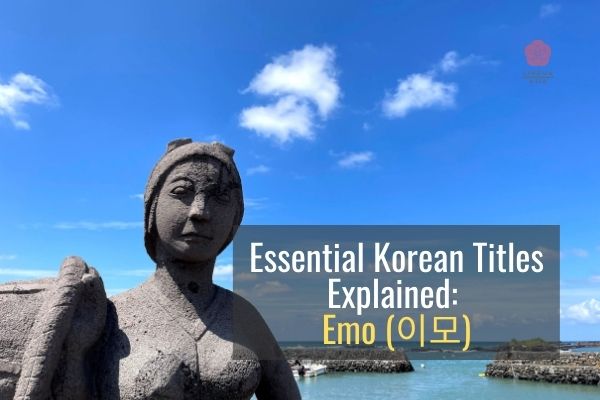Not sure why Koreans call some women emo (이모)?
Find out its meaning and how to use it below!
We also cover:
- pros and cons of emo
- what you can do for emo
I’m lucky enough to have 4 biological emo who are super nice.

Quick Summary
- Emo in Korean means aunt and is used by everyone.
- Emo can be an actual aunt, mom’s friend, or middle-aged woman.
Korean doesn’t use second person pronouns like “you” politely among acquaintances. The easiest way to address someone daily is with kinship terms like emo.

What does emo mean in Korean?
Emo (이모 in hangul) means “aunt” or “auntie”, and is used by both genders. Here are some situations where the word comes in handy:
Actual aunt
Emo is an aunt, but only your mom’s side. So, emo can be your mother’s older/younger sisters. If you have multiple emo, you call them “first emo (첫째 이모)”, “second emo (둘째 이모)” and so on based on eldest to youngest.
A husband of your emo (aunt) is called, “emobu (이모부)“.
Your father’s sisters are “gomo (고모)“, and their husbands are “gomobu (고모부)“.
Most Koreans are closer to their emo than their gomo. This might be because sisters in Korea tend to gather more often, so you’ll interact with them frequently.
Mom’s friend
Most Koreans grow up calling their mom’s friends, “emo”. But, their husbands are not called emobu.
Middle-aged woman
You can also address a middle-aged woman in a friendly way by calling her emo.
When in doubt about a woman’s age, play it safe by calling her “emo” instead of “ajumma“. When you really want to score some points, call her “unnie” if you’re female, or “noona” if you’re male.
LAN cable auntie (랜선이모)
A young woman who’s not a biological aunt, but watches and adores other people’s kids (usually celebrity babies or celeb’s kids) on TV or the internet like her own nephews/nieces. They refer themselves as I’m __’s 랜선이모.
Insider Tips!
- In casual and folksy places like a farmer’s market, tavern or restaurant, when a female staff member is a middle-aged woman, customers refer to them as “emo (이모 or auntie)” or “sajangnim (사장님)”.
- When you call them emo instead of ajumma, service/subeesu will definitely be on the table.
How to make emo honorific?

Putting enough respect on someone’s name is a major hurdle for Korean language learners.
There are two levels of kinship terms, plain and honorific.
You may address your aunt and women in that age group as emo.
To be extra polite, you can use “emo-nim (이모님)” in other situations like when addressing a cleaning lady or babysitter. (In Korea, they’re usually middle-aged women and appreciate the respect.)
The honorific suffix “-nim” is the most common way to make a word honorific. You can add this to most titles and kinship terms.
What are the pros and cons of emo?
Pros are plenty! Emo gives you gifts, affection and support.
One of my fondest memories of my aunt is when my dad got into a car accident and my mom had to take care of him at the hospital (bear with me). I was about to have a birthday ceremony/party wearing hanbok at my kindergarten, which traditionally involved mother/daughter hanbok photos. My emo who lives in Seoul visited me all the way down south in Changwon, so I didn’t feel left out.
Cons are none! I have 4 aunts and I love them all. No complaints here.
I’ve heard from others that they’ll either treat you really well or not spend time with you at all. But, I’ll tell you what they aren’t doing, nagging.

What does emo do for you?
For biological nieces and nephews:
Emo really enjoy taking care of you. They’ll pay for meals, give you a lot of spending money (용돈 or yongdon), and let you stay at their house. As people who are somewhere between generations, emo will also mediate disagreements with your mom and explain your point of view. They’re basically all the things you love about moms without the nagging. I’m lucky to have many awesome emo I love hanging out with.
For friend’s children:
Having a mom’s friend as emo is pretty sweet too. They’ll probably side with your mom (because they’re her friend) more than you, but they still love you and treat you well. I had a lot of nice non-biological emo growing up.
What do you do for emo?
After getting a job, I started taking my emo out to nice restaurants and cafes. Also, they really appreciate when you give them birthday gifts. I received so much from my aunts, so I bought them cute purses, desserts, cosmetics, wine, etc.
I also have older aunts that I use honorifics with and younger aunts that I use banmal (casual speech) with. Use honorifics accordingly depending on the age gap and how close you are.
Korean has a two helpful ways of referring to aunts and uncles that you can use daily:
- Emo (이모)
- Samchon (삼촌)
These are also used to directly refer to people outside your family as well.
For example, you may call a female who looks at least 20 years older than you, “emo” in some situations, even though you’re not related.
Having emo can be super fun in Korea. Even calling a middle-aged waitress “emo” will create a sense of warmth and foster jeong.
FAQ
What is aunt in the Korean language?
What you call your aunt in Korean depends on which side of the family they’re on and if they’re a blood relative.
- On your dad’s side of the family: Gomo (고모)
- On your mom’s side of the family: Emo (이모)
- Your father’s younger brother’s wife: Sukmo (숙모)
What’s the difference between Emo (이모) and Gomo (고모)?
Both Emo and Gomo mean an “aunt” in Korean, but Emo refers to your mom’s sisters and Gomo is your dad’s sisters.
What’s the acceptable age gap for calling an older female “Emo”?
About 20 years is a good rule of thumb. For under 20-year age differences, you can call a female unnie or noona. If the actual age is unknown and a woman looks youngish, you can still call them unnie or noona. On the other hand, if one looks older than their age, middle or high school students may refer to them as emo, even if they’re only in their 20s. When in doubt, ask.
Subscribe for
exclusive info on Korea
Did we miss anything?
Let us know your thoughts on emo in the comments!







